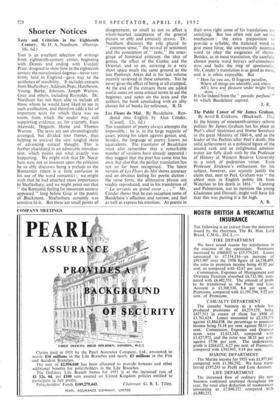Shorter Notices
THIS is an excellent selection of writings from eighteenth-century critics, beginning with Dennis and ending with Uvedale Price, designed to show how in the eighteenth century the neo-classical dogmas—never very firmly held in England—gave way to the aesthetics of sensibility. It includes extracts from Shaftesbury, Addison, Pope, Hutcheson, Young, Burke, Johnson, Joseph Warton, Gray and others, including Reynolds. Dr. Needham has not been able to include all those whom he would have liked to see in such a collection, and therefore adds a list of important texts for which there was no room, from which the reader may cull supporting evidence, as, for example, from Akenside, Hogarth, Hume and Thomas Warton. The texts are not chronologically arranged, but divided into themes, thus helping to unravel the very tangled skein of advancing critical thought. This is further elucidated in an admirable introduc- tion, which points out what exactly was happening. We might wish that Dr. Need- ham were not so insistent upon the criticism he so ably discusses being a prelude to the Romantics (there is a little confusion in his use of the word romantic) ; we might wish that he had attached more importance to Shaftesbury, and we might point out that " the Romantic feeling for mountain scenery appeared" long before Gray in the poetry of Blackmore. Shaftesbury certainly was sensitive to it. But these are small points of disagreement, so small as not to affect -a whole-hearted acceptance of the general picture so ably and concisely drawn. Dr. Needham discusses the role played by "common sense," the revival of sentiment and the conception of " taste," the emer- gence of historical criticism, the idea of genius, the effect of the Gothic and the Oriental, and so on, covering in a very short space much the same ground as the late Professor Atkin did in his last volume recently reviewed in these columns. Yet he never gives the effect of being at all cramped. At the end of the extracts there are added useful notes on some critical terms to aid the beginner, and notes on the texts and the authors, the book concluding with an ably chosen list of books for reference. B. D.


































 Previous page
Previous page